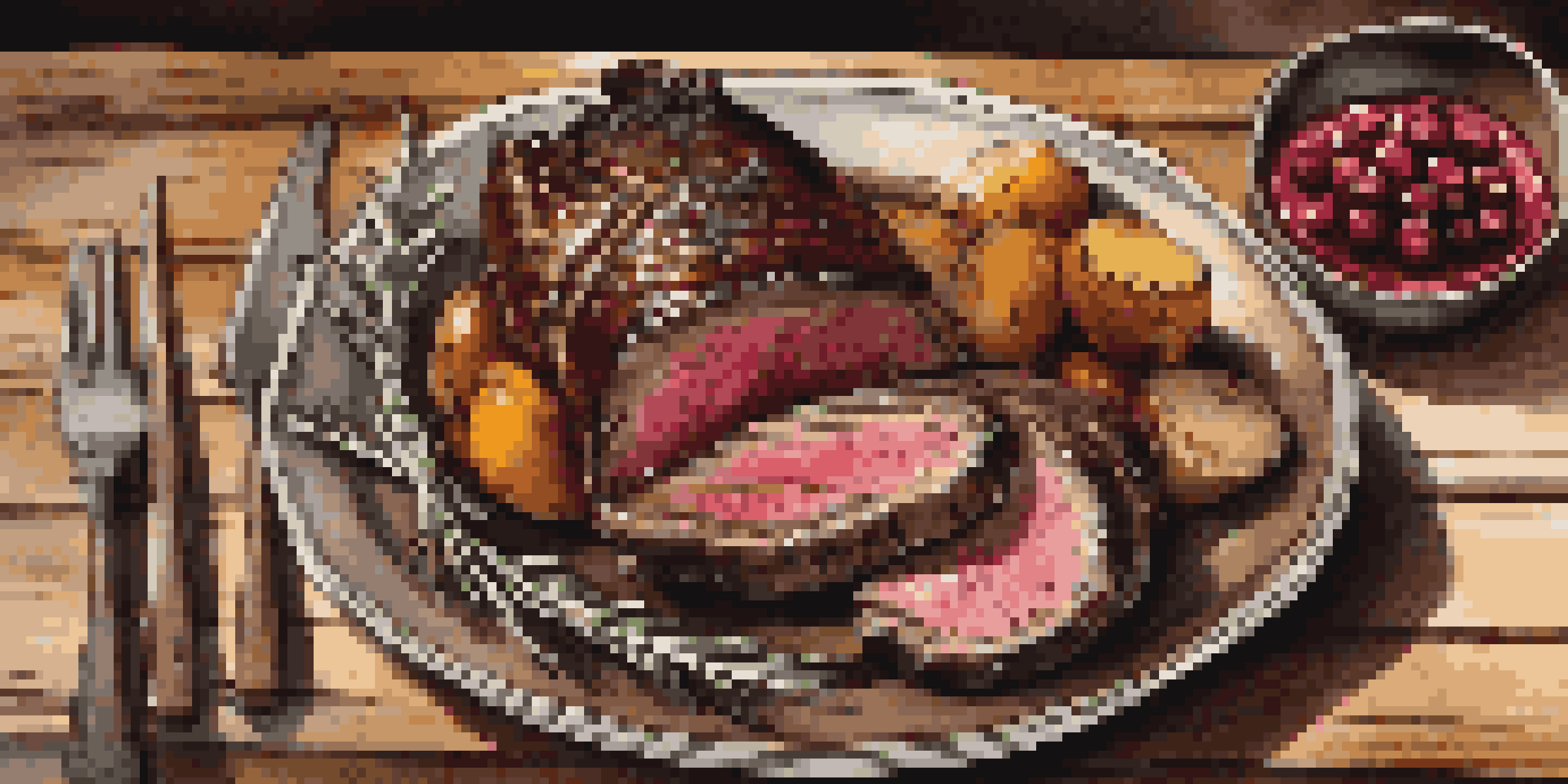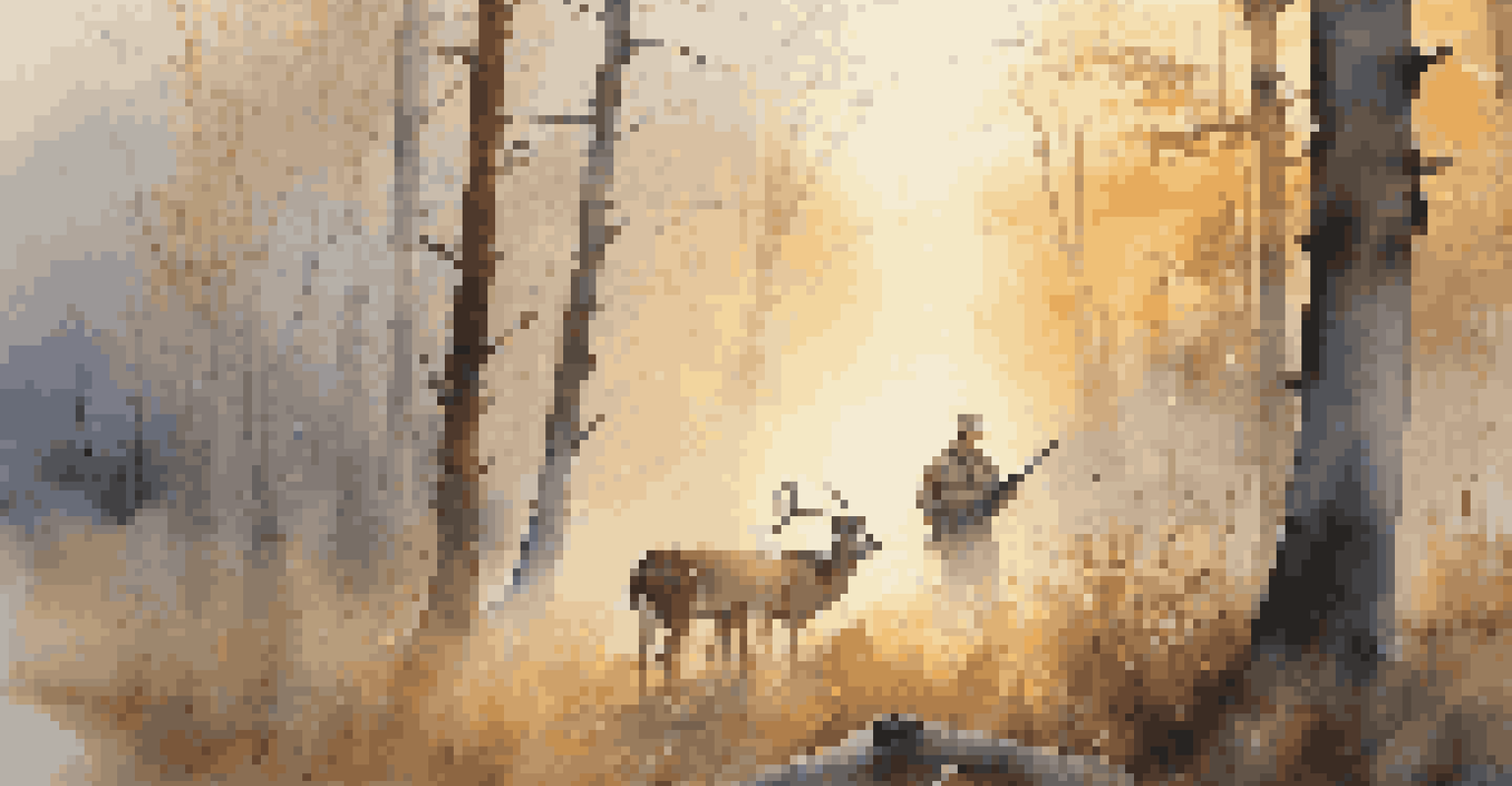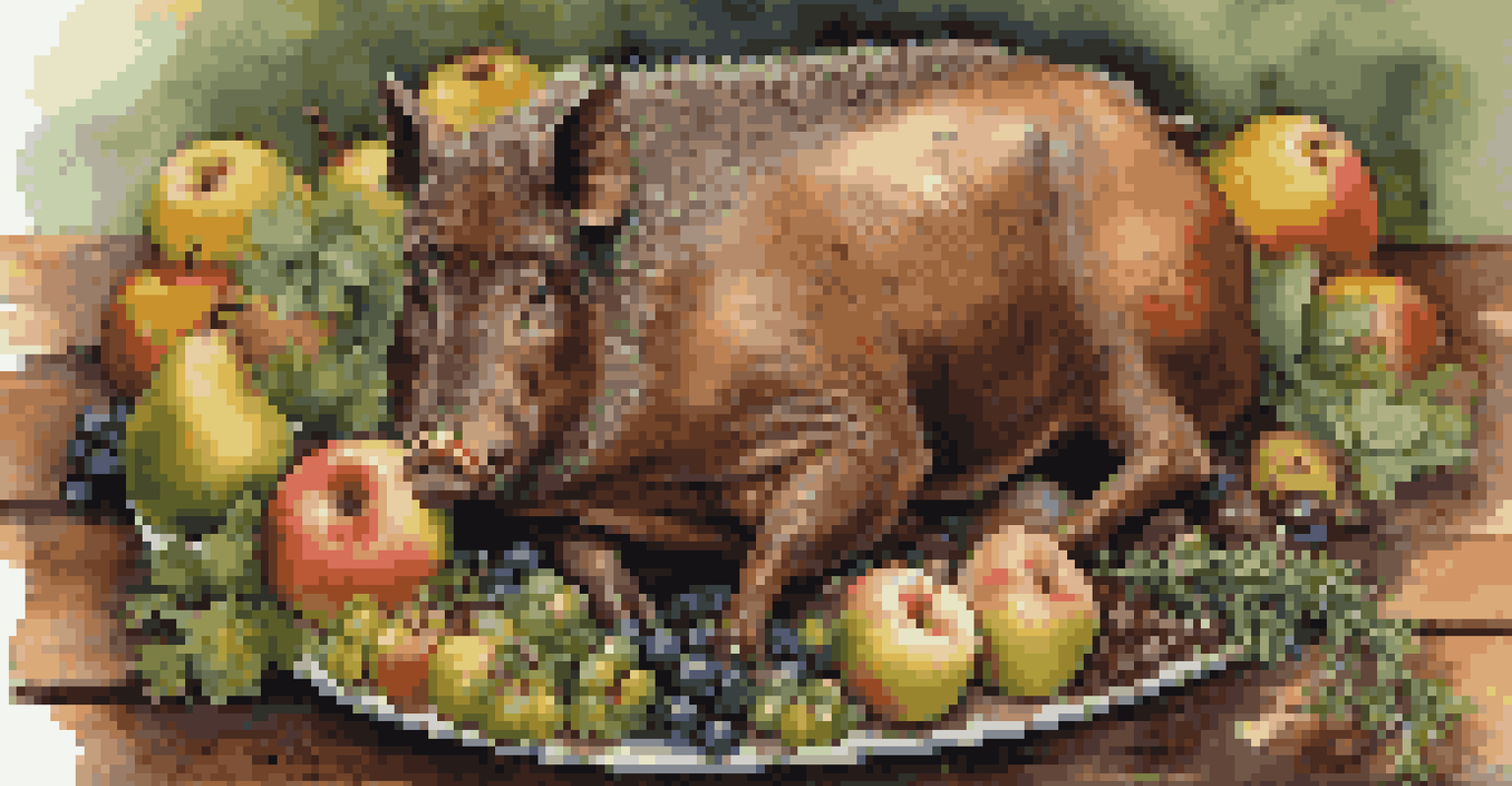The Benefits of Cooking with Wild Game: Nutritious Methods

Understanding Wild Game: A Nutritional Powerhouse
Wild game is often leaner and more nutrient-dense than traditional meats. Animals such as deer, elk, and wild boar are typically raised in their natural habitats, resulting in healthier meat. This means fewer unhealthy fats and more protein, vitamins, and minerals, making wild game a great choice for health-conscious eaters.
Wild game is the ultimate expression of local culinary traditions.
Incorporating wild game into your diet can help diversify your protein sources. For those tired of the same old chicken or beef, wild game offers a unique flavor profile and variety. Plus, it can be a great conversation starter at dinner parties!
Moreover, many wild game meats are free from the antibiotics and hormones commonly found in farm-raised animals. This natural approach not only contributes to better health but also supports ethical consumption practices.
Sustainable Eating: The Environmental Impact of Wild Game
Choosing wild game can contribute positively to the environment. Hunting helps manage wildlife populations, preventing overpopulation that can lead to habitat destruction. This means that by cooking with wild game, you’re not just nourishing yourself; you’re supporting ecological balance.

Additionally, wild game is often sourced from local areas, reducing the carbon footprint associated with transportation. When you buy wild game, you’re more likely to support local hunters and economies, fostering a sense of community and responsible consumption.
Sustainability also means being mindful of the methods used in hunting and cooking. By opting for responsible and humane hunting practices, you can ensure that your meal is both ethical and environmentally friendly.
Cooking Techniques for Wild Game: Keeping It Nutritious
When preparing wild game, it’s essential to choose cooking methods that preserve its nutritional value. Techniques such as grilling, roasting, and slow cooking can enhance flavors while retaining important nutrients. For example, grilling can add a smoky taste without the need for excess fats.
Eating wild game connects us to the land and the ecosystems that nourish us.
Marinating is another fantastic way to infuse flavor and tenderize tougher cuts of wild game. Using natural ingredients like citrus, vinegar, or yogurt can enhance the meat's taste while ensuring it remains healthy. Plus, marinating can help break down the protein, making it easier to digest.
Lastly, being mindful of cooking times is crucial. Overcooking wild game can lead to dryness and loss of nutrients, so using a meat thermometer can help you achieve the perfect doneness while keeping the meat juicy and flavorful.
Flavor Pairings: Elevating Wild Game Dishes
Wild game has a robust flavor that pairs beautifully with a variety of ingredients. Bold spices like juniper berries, rosemary, and garlic can complement the natural taste of the meat, enhancing its depth. Think of a wild boar roast seasoned with these spices; it’s a culinary adventure waiting to happen.
Fruits such as apples, pears, and berries can also create delightful contrasts. For instance, a venison stew with a hint of cranberry adds a sweet-tart note that balances the rich flavors of the meat. It’s all about creating harmony on the plate.
Don’t forget about vegetables! Root vegetables like carrots and potatoes, when roasted alongside your wild game, can soak up the juices and flavors, creating a wholesome and hearty meal. The combination of these elements can turn a simple dish into a gourmet experience.
Health Benefits of Wild Game: A Nutritional Comparison
When comparing wild game to conventional meats, the health benefits are striking. For example, venison typically contains lower fat and cholesterol levels than beef, making it a heart-healthy choice. This can be particularly beneficial for individuals looking to manage their cholesterol or weight.
Wild game is also rich in essential nutrients, including omega-3 fatty acids, iron, and B vitamins. These nutrients play crucial roles in maintaining energy levels, supporting brain function, and promoting overall health. By opting for wild game, you’re not just enjoying a meal; you’re fueling your body with what it needs.
Furthermore, the unique nutritional profile of wild game can support a more balanced diet. With its varied amino acids and micronutrients, it can help meet dietary needs that might be lacking in a standard meat-heavy diet.
Embracing the Hunting Culture: A Community Experience
Cooking with wild game often begins with the hunting experience, which fosters a deeper connection with food. Many hunters see their efforts as a way to connect with nature, appreciate their surroundings, and contribute to local ecosystems. This sense of community can enhance your appreciation for the meal on your plate.
Moreover, hunting can be a social activity, bringing friends and family together for shared experiences. Whether it's a weekend hunting trip or a family gathering to process the meat, these moments create lasting memories and strengthen bonds.
By embracing the hunting culture, you also become part of a tradition that values self-sufficiency and respect for nature. This way of life promotes a sustainable future and encourages others to consider the origins of their food.
Getting Started: Tips for Cooking Wild Game at Home
If you're new to cooking with wild game, start with familiar cuts. Ground game meats or tender cuts like backstrap are often easier to work with and can be used in a variety of recipes. Think about using ground venison in tacos or burgers for a tasty introduction to wild game.
Don’t hesitate to experiment with flavors and cooking methods. The beauty of wild game is its versatility, so try different marinades, spices, and cooking techniques to find what works best for you. You might discover a new favorite dish along the way!

Lastly, consider joining local cooking classes or online forums focused on wild game preparation. Engaging with a community of enthusiasts can provide valuable tips, inspiration, and encouragement as you embark on your culinary journey.